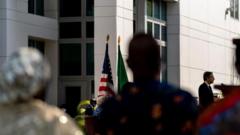Starting July 8, Nigerian applicants will face reduced visa validity, moving to single-entry visas valid for just three months, reflecting heightened scrutiny and diplomatic shifts.
US Tightens Visa Regulations for Nigerian Travelers

US Tightens Visa Regulations for Nigerian Travelers
New visa limitations for Nigerian citizens come as part of a global policy realignment by the US State Department.
The United States has implemented significant changes to its visa policies affecting Nigerian citizens, reducing the validity period and access for most non-immigrant travelers. Effective July 8, the US Department of State announced that nearly all non-immigrant and non-diplomatic visas for Nigeria will be limited to single-entry and valid for only three months— a stark reduction from the previous conditions, which permitted multiple entries over two years or more.
This adjustment is part of a worldwide reciprocity effort, coinciding with Nigeria’s own visa policy that issues single-entry visas valid for three months to US travelers. A response from the Nigerian government is yet to surface.
The State Department's statement indicated that visa policies are "subject to ongoing review," suggesting that they could change in response to shifting diplomatic, security, and immigration criteria. The US is also collaborating closely with Nigerian officials to ensure compliance with international standards, which encompass issuing secure travel documents, managing visa overstays, and sharing security or criminal data aimed at public safety.
Furthermore, new scrutiny measures will mandate the vetting of social media accounts for all visa applicants, including Nigerians, checking for any signs of hostility towards the US and its foundational principles.
Nigerian students represent one of the largest groups of international visa applicants to the United States. According to the 2024 Open Doors report on international educational exchange, Nigeria ranks as the seventh-highest source of international students in the US, with a 13.5% increase in enrollments, totaling 20,029 students.
In reaction to these changes, a former aide to ex-President Muhammadu Buhari expressed the view that the US is failing to reciprocate, instead demonstrating discomfort with Nigeria’s recent geopolitical movements, particularly its engagement with BRICS nations. Bashir Ahmad’s remarks on social media suggested that this decision may stem from Nigeria's growing acceptance on the global stage.
As the situation evolves, the implications for Nigerian travelers and students remain to be seen, sparking discussions about broader international relations.






















